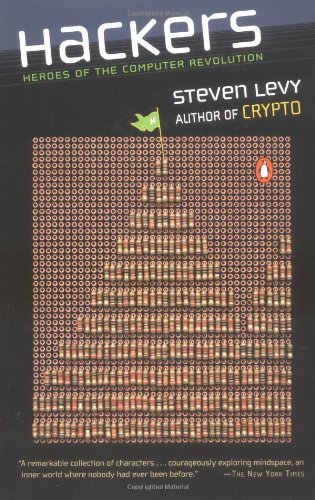
Hackers: Heroes of the Computer Revolution
by Steven Levy
30 popular highlights from this book
Key Insights & Memorable Quotes
Below are the most popular and impactful highlights and quotes from Hackers: Heroes of the Computer Revolution:
“Systems are organic, living creations: if people stop working on them and improving them, they die.”
“the Hacker Ethic, which instructs you to keep working until your hack tops previous efforts.”
“It’s your life story if you’re a mathematician: every time you discover something neat, you discover that Gauss or Newton knew it in his crib.”
“Every problem has a better solution when you start thinking about it differently than the normal way.”
“Hackers can do almost anything and be a hacker. You can be a hacker carpenter. It’s not necessarily high tech. I think it has to do with craftsmanship and caring about what you’re doing.”
“She noted the lack of female hardware hackers, and was enraged at the male hacker obsession with technological play and power.”
“To hackers, a program was an organic entity that had a life independent from that of its author.”
“To Dick’s mind, the flow of information should be channeled with discretion, with an unambiguous interpretation controlled by the people at the top.”
“Peter Samson and his friends had grown up with a specific relationship to the world, wherein things had meaning only if you found out how they worked.”
“to absorb, explore, and expand the intricacies of those bewitching systems;”
“You talk about deus ex machina, well, we're talking about deus in machina. You start by thinking there's a god in the box. And then you find there isn't anything in the box. You put the god in the box.”
“We believe that innovative authors are more likely to come from people who are independent and won’t work in a software ‘factory’ or ‘bureaucracy.”
“Because to hackers, passwords were even more odious than locked doors.”
“Third-Generation hackers never had the sense of community of their predecessors, and early on they came to see healthy sales figures as essential to becoming winners.”
“When computers are sold like toasters, programs will be sold like toothpaste.”
“Hacker Ethic: like lines of code in a systems program, compromise should be bummed to the minimum.”
“there were no artificial obstacles, things that are insisted upon that make it hard for people to get any work done — things like bureaucracy, security, refusals to share with other people.”
“I think that hackers — dedicated, innovative, irreverent computer programmers — are the most interesting and effective body of intellectuals since the framers of the U.S. Constitution”
“Acolyte: Oh machine, would you accept my offer of information so you may run my program and perhaps give me a computation? Priest (on behalf of the machine): We will try. We promise nothing.”
“The man of the future. Hands on a keyboard, eyes on a CRT, in touch with the body of information and thought that the world had been storing since history began. It would all be accessible to Computational Man.”
“Hackers should be judged by their hacking, not bogus criteria such as degrees, age, race, or position.”
“I think that hackers—dedicated, innovative, irreverent computer programmers—are the most interesting and effective body of intellectuals since the framers of the U.S. Constitution . . . No other group that I know of has set out to liberate a technology and succeeded. They not only did so against the active disinterest of corporate America, their success forced corporate America to adopt their style in the end. In reorganizing the Information Age around the individual, via personal computers, the hackers may well have saved the American economy . . . The quietest of all the ’60s sub-subcultures has emerged as the most innovative and powerful. —Stewart Brand Founder, Whole Earth Catalog”
“I don’t know Stallman well. I know him well enough to know he is a hard man to like.” (And that was in the preface of Stallman’s own book!)”
“All information should be free. If you don’t have access to the information you need to improve things, how can you fix them? A free exchange of information, particularly when the information was in the form of a computer program, allowed for greater overall creativity.”
“Computer programming was not merely a technical pursuit, but an approach to the problems of living.”
“project undertaken or a product built not solely to fulfill some constructive goal, but with some wild pleasure taken in mere involvement, was called a “hack.”
“Hackers believe that essential lessons can be learned about the systems—about the world—from taking things apart, seeing how they work, and using this knowledge to create new and even more interesting things. They resent any person, physical barrier, or law that tries to keep them from doing this.”
“qualify as a hack, the feat must be imbued with innovation, style, and technical virtuosity.”
“Burrell Smith, the designer of the Macintosh computer, said it as well as anyone in one of the sessions at the first Hacker Conference: “Hackers can do almost anything and be a hacker. You can be a hacker carpenter. It’s not necessarily high tech. I think it has to do with craftsmanship and caring about what you’re doing.”
“fragile. So that to be able to defy a culture which states that ‘Thou shalt not touch this,’ and to defy that with one’s own creative powers is . . . the essence.” The essence, of course, of the Hacker Ethic.”


